Metal Gear Solid 5: The Phantom Pain review (in progress)
Look, no spoilers – but for all the myriad conspiracy theories about The Phantom Pain, no one predicted Hideo Kojima would sacrifice his most famous son: the cut-scene. In MGS5, gaming's grandest, most convoluted, storyteller decorates his final game with only a skeleton of a plot – but delivers the series' greatest stories yet, by handing you authorship of one of history's deepest open-world epics. At least, that's the intro I want to write… but this isn't a review of MGS5. It's a snapshot of thoughts taken from 30-35 hours play, but I'm in no position to score the game. Yet. Like the masterful, inventive and daunting MGS5, it's… complex.
For fear of spoilers, Konami invited journalists to review the game at five-day 'boot camps' tied to strict NDAs (non-disclosure agreements). We played between 9am to 5pm, with no unsupervised play outside these hours. That's a maximum play time of 40 hours, assuming no stoppages for eating, drinking, stretching… or reality. So you're trying to complete a 35-50 hour game (or longer, depending on your play style and the nature of your 'completion'… I can't say more), that you've been anticipating for five years, in a realistic window of 30-35 hours. On one hand, you're finally immersed in one of the deepest, most experimental, open-worlds in history – overwhelmed by side-missions, upgrades and secrets – on the other, haunted by a tick-tock race to reach the 'end' without knowing when that is.
Konami's conundrum is clear. Sending out retail review copies would lead to ruinous spoilers, but the alternative is no pre-release reviews. Extended access under duress is better than none but, twinned to our NDA, makes this a 'review' of what I can't and won't say. So with some fairly major caveats laid bare – is MGS5 everything we were all hoping for?
TLDR: it's brilliant. MGS5's victory is its meticulously crafted, stacked and interrelated systems, that give you more control, more choice, than almost any other game – including Dishonored, Hitman and Deus Ex. I could fill pages describing the upgrade path of one piece of equipment, and how it interrelates to another skill tree. To save the words, MGS5's 30 minute E3 demo shows four hugely-diverse ways to complete the A Hero's Way mission, as posted below. No time? Watch the 38 second cardboard box video, and realise why collecting pin-up posters from the open-world isn't just a random collectible. In MGS5, all your 'off mission' busywork and discovery can be re-invested to improve the core experience.
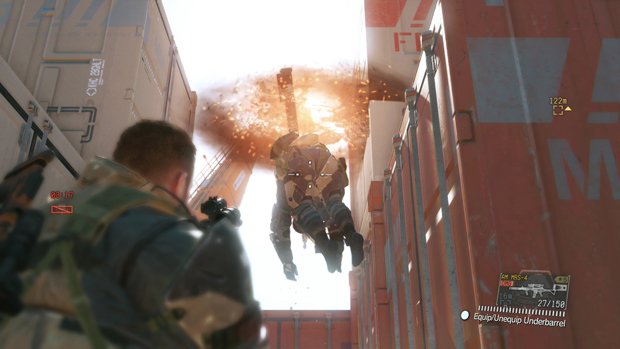
For perspective, I hadn't unlocked some of these abilities after 30 hours – like Quiet's ricochet shot, where she shoots grenades in mid-air, allowing them to travel around corners. During my playthrough, I barely experimented with the extensive Mother Base system, or attempted hardly any side-ops: non-essential, but highly worthwhile, missions which reward you with vital resources e.g. a translator, allowing you to interrogate guards for clues about item locations.
It sounds daunting, but MSG5 drip feeds its depths. For example, the Forward Operating Base (FOB) elements – where online rivals can infiltrate your remote base – doesn't unlock until way, way into the game. You're usually given a veiled dry-run with every new piece of equipment – for example, against a lone guard – and the game 'locks' unnecessary menu options when introducing a new Mother Base or iDroid function to make learning easier.
That said, it's huge, and I recall staring at screens of options, 20 hours in (at around 25% or less completion), with 19 pending R&D projects, 30+ un-listened audio tapes, scores of 'completed' missions with at least four hidden sub-objectives blanked out, and ten un-tackled side-ops. It's a real challenge for the more traditionally-orderly MGS gamer, who might regard any mission as a failure, unless they've nailed an S rank with zero kills and zero alerts. Fuelled by time pressure, I completed several missions covered in blood, sprinting with a hostage on my shoulders, alerts blaring and with mortars raining down all around. The scope for replay is staggering. If you consider MGS: Ground Zeroes – derided for its length despite its staggering tactical depth – then MGS5 feels around 50 times bigger (while the actual Phantom Pain map is 200 times bigger than Ground Zeroes), with a dazzling variety of missions.
Weekly digests, tales from the communities you love, and more
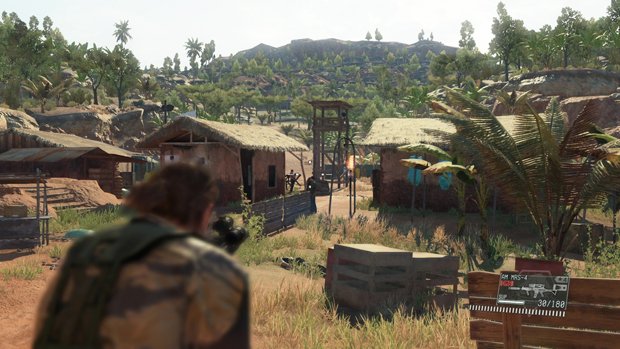
GTA5 offers greater geographical variety, but its controls are Duplo bricks to MGS5's Technic lego. MGS5's wealth of options empower you to write new stories with every replay – the game will yield astonishing acts of skill and creativity for months, if not years, to come. As proof, I bet most reviewers will begin their thoughts with a unique anecdote, or lists of random events. I have those stories too: slow-motion diving from a bear before frantically tranquilizing it with my final dart. Or the mission I failed ten times by implementing an insane strategy, that climaxed in me riding D-Horse at full pelt on the open African wetlands chasing a truck (and its insanely powerful escort) with an RPG before scraping to victory… The list goes on, but these are my stories, and your enjoyment of MGS5 will be written by your own.
Missions can blur, with the focus on hostage extraction, target execution and item destruction. However, it's wiser to knock out, not kill, targets as you can harness their skills for Mother Base, so this places the emphasis on stealth. At times, it's almost a mantric pattern of re-equipping and re-deploying to the battlefield; a swirl of similar images and noises – but, I suspect, this numbing effect is quite deliberate, and will be bore out by the game's wider themes of 'cycles of revenge’. In other words, how rivalries are forged in ongoing conflicts and passed between generations through urban myth. One man’s freedom fighter, is another’s terrorist, and feeds into why hero Big Boss ultimately becomes known as the series’ key villain – although it may not be this obvious. Kojima understands pacing and lulls are mostly followed by an unexpected plot revelation, boss battle or shift in tone. Geography diversifies the challenge: it's simple to extract a hostage from a low-security camp, less so a fast-moving fleet of tanks.
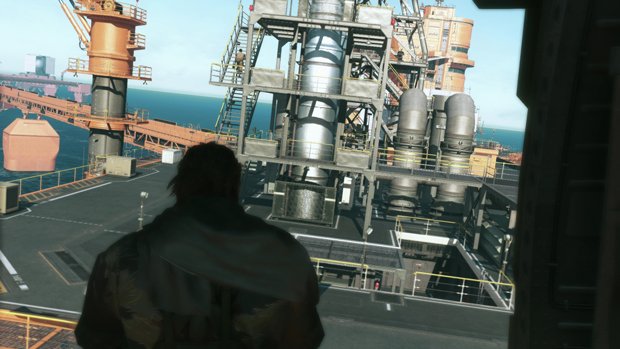
MGS4's boss battles are fairly pedestrian – save Laughing Octopus and Screaming Mantis – but MGS5 is a return to form. Still, there's nothing – well, as far as I've played, which is a mission or two shy of the 'ending' – to rival the eccentricity and diversity of MGS3; although some battles do pay fan-nodding homage to series' highlights. There's one strain of recurring foe that requires attritional brute force, which feels a little dumb – but there may be a smarter, short-cut, solution for lateral thinkers waiting to be discovered. Slightly annoyingly, sometimes you can run away from a foe and complete the mission, at other times it forces a maddening, painful checkpoint reset. You can be punished for knowing the MGS series too well. One battle implies you can accidentally kill a key character, so I employed classic 'stamina kill' tranquilizer tactics from MGS3 – a gruelling game of cat-and-mouse – only to discover 'lethal' weaponry is fine.
If you've struggled with the previous MGS games' fussy controls, or bewildering plot, this is the most intuitive, self-contained entry yet. At core, it plays like MGS: Ground Zeroes, but the game is more tonally upbeat, though not without teeth-clenching shocks or grey area morality. The game's full of subtle nods to MGS lore, but all the really hardcore, fan-nodding, plot nuances are hidden in the optional cassette tapes to be listened to as you roam the battlefield. You don't even need to know the plot of Ground Zeroes and the game recaps it in any case. From the intro's opening seconds, you're intuitively funneled to learn the controls, and your motivations are clear: it's a revenge tale, pure and simple. At least, that's Kojima 'simple' but… you'll see.
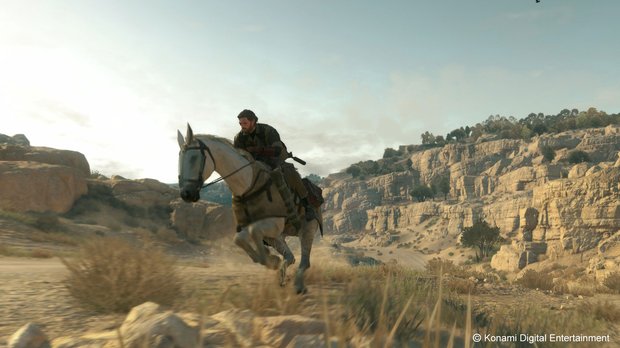
If anything, hardcore fans might be a touch disappointed with the brevity of cut-scenes, and the core plot is slightly vanilla for those weened on the meta-concepts of the La-Li-Lu-Le-Lo. Don't get me wrong: this is an epic of rich themes, with myriad twists and turns, but I'm yet to experience a 20 minute cut-scene about the role of The Patriots in 20th century history like in MGS4. The major caveat is that I'm yet to finish the game, and even that description is inaccurate… but I can't explain for fear of spoilers. Case in point: if you hadn't seen MGS2's ending, you'd be forgiven for criticizing hero Raiden as unrealistically naive, without realizing the character's importance to MGS2's deliberately formulaic, and highly meta, structure. MGS5 might, I suspect, be hiding a similar game-system-as-theme metaphorical context.
At times, the tacit, self-imposed, pressure to finish missions *properly* can feel overwhelming, and the game haunts your thoughts. I spent one night of boot camp dreaming about slow-motion Reflex takedowns in order to avoid tripping an alert and waking myself up, and a morning in the shower mulling fresh tactics for an evil cargo extraction mission. MGS5 deliberately puts you through mental anguish, allowing you to pass missions with, say, four of seven objectives complete (a hardcore player's nightmare) but this is failure as strength. Few games force you to rethink scenarios and events so fervently, or fantasise about how you'd tackle them with better kit. At times, you almost feel a physical longing when away from the screen. I know that sounds mad, but that's what happens when you play a game eight hours a day for five days.
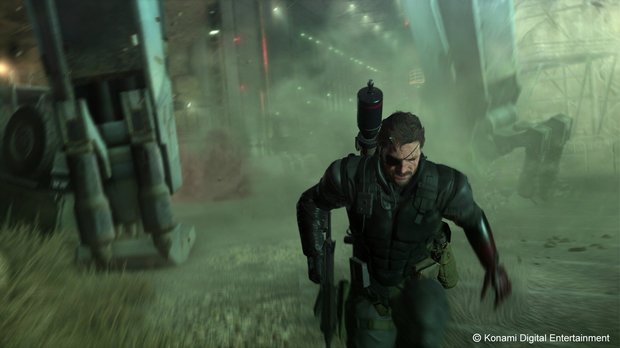
Is MGS5 a fitting legacy to the series? I can't say… yet. Based on the UK boot camp, I know of only one reviewer (who was able to play for six days) who has seen enough of the game to deliver a meaningful perspective… and I can't even explain why for fear of spoilers. In my boot camp, reviewers were charging through missions wearing the chicken hat (which makes you invisible) almost completely ignoring Mother Base and all the side-ops in a race for the 'end'. Will it score high? I mean, duh, but I don't feel the boot camp was sufficient basis to offer my views on Kojima's intentions and MGS5's abiding legacy.
At times, the boot camp felt like being gifted a bottle of Macallan 1946 whiskey in a frat house and being told to chug, chug, chug. MGS5 might be the most accessible Metal Gear yet, but it's a connoisseur's game. Like all indulgences, too much in one session sours the appeal. You need to measure it out. Savour it. I believe MGS5 has something for everyone, but the game's finer nuances will be lost on some players, who either won't have developed the taste, or be able to discern the subtleties.

What do I think, at this stage, as vaguely lunatic fan? It's incredible. For me MGS5 is the densest, most considered, open-world stealth game ever, with a sense of physical space to rival Red Dead Redemption, but precise, deep controls that only the greatest Japanese action games seem to understand. It doesn't really feel like any MGS game before it, but is the culmination of everything the series has been building toward. The MGS series has always been defined by its contradictions: its double and triple agents, its characters of multiple aliases and grey area morality. If Metal Gear Solid is an anti-war series that makes war feels heroic, MGS5 is its purest expression yet. At the same time, though, it’s the least 'Metal Gear' Metal Gear game ever, liberated from its traditional, relatively-linear structure and yawing cut-scenes. That's my non-review review and, until I receive and finish the game, this confounding duality is as fitting a conclusion as the brilliant, challenging and idiosyncratic MGS5 deserves.

FGS Content Director. Former GamesRadar+ EIC, GTAVoclock host, and PSM3 editor; with - *counts on fingers and toes* - 20 years editorial experience. Loves: spreadsheets, Hideo Kojima and GTA.


